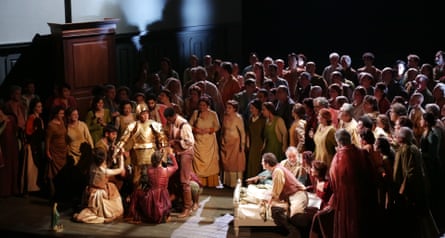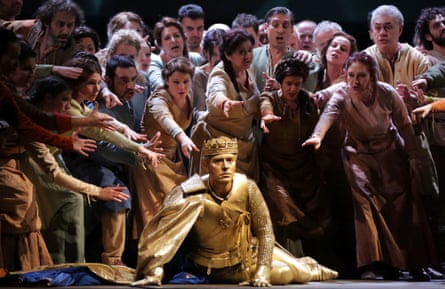
Inside, white lilies hung in cascades around the royal box in discreet tribute to the French martyr Joan of Arc, whose heraldic ensign bears that symbol of purity, and whose story has been immortalised by many, including Verdi in his Giovanna d’Arco (1845). The opera was back at La Scala, Milan for the first time in 150 years, in a new production to open the season. This first night, “La prima”, is always held on 7 December, feast day of Saint Ambrose, patron saint of the city. For the first time, Riccardo Chailly, principal conductor and successor to Daniel Barenboim, was on the podium, with Anna Netrebko ablaze in the title role of warrior-saint and Francesco Meli lustrous and compelling as Carlo VII, king of France.
Outside, armed police with riot gear lined the piazza surrounding the theatre. One of the most illustrious events in the European cultural calendar, La prima habitually attracts protesters of various persuasions. A few turned up, confined to the far side of the square. Most stayed away. For Milan last week was una città blindata – an armoured city. Following the Paris attacks last month, US security services had identified La Scala as a possible target. Hundreds of extra police were mobilised to protect a theatre that seats around 2,000. Streets were shut, metal detectors in use. The foyer, already split in two by the statutory red carpet, was gridlocked by paparazzi and an influx of security guards.

Yes there was glamour, but with barely an inch of space to twirl, with all these extras, it was rather wasted and no one paid much attention until Patti Smith, fresh from performing in Paris with U2, walked in, simply dressed in black and “carrying her glasses”, as a fashion reporter effortfully noted. The French ambassador to Italy was present. The irony of the election success, only hours earlier, of Marine Le Pen, leader of France’s Front National, who closely associates herself with Jeanne d’Arc, was lost on no one. Chailly, at a press conference, would not be drawn into politics. This, he said, was an opera about the father-daughter relationship so important in Verdi’s operas. The work shows, too, how narrowness of belief can lead to blind misunderstanding.
Chailly also expressed what many felt: that whatever fear he may experience, all he could do was carry on, lead his musicians, honour his audience. The Italian prime minister, Matteo Renzi, was there together with the elite of the city. Mary Shelley, on her travels in 1840, called La Scala the “universal drawing room for all the society of Milan”. It still is, but where once there were gaming tables in the lobbies, now sharp attention is paid to the opera. La Scala has long had its political turmoils, arguments about money, strikes over pay and conditions, walkouts and accusations of chaos. Now one of their own is at the helm. Chailly grew up in La Scala, where his father worked and he, as a young man, learned his trade from the late Claudio Abbado.
Many assumed there would be petulant disapproval about Chailly’s choice of Giovanna d’Arco – which makes its triumph in a somewhat pantomimic, multi-stylistic staging by the French-Belgian duo Moshe Leiser and Patrice Caurier all the more remarkable. No boos, only cheers, repeated curtain calls, flowers and confetti raining down from the balconies, and enthusiasm for the work itself. Since his youth, Chailly, 62, has been a champion. He conducted a performance back in 1989 (now on YouTube). One of his plans for La Scala is a return to Italian repertoire, core as well as more marginal, such as this maligned work, written for the theatre with which Verdi was so closely connected. Chailly’s decision was vindicated. A reported row between him and the directors – Chailly apparently asked for some changes to the staging – is such a run-of-the-mill circumstance of opera that it’s hardly worth mentioning: the musical triumph far outshone the dramaturgy.
Set near Rouen in 1429, the action is based loosely on Schiller. Carlo VII is about to surrender to the enemy English. Giovanna dreams of taking up arms for her country. Her pious father believes the girl is in league with the devil or, worse, no longer intacta. Only as she lies dying is her innocence proven in a celestial revelation. Verdi and his librettist, Solera, added mystic choruses of vile demons, with mawkish accompaniment of harmonium and triangle or, when the angels turn up, a heavenly harp.
These choral outbursts are creepily thrilling, and if some think the results abysmal (a word used in the dictionary of opera I checked in advance), I can only admit to bad taste. The score is rousing and vivid, the offstage band stirring, the vocal writing daring and dangerous, with an a cappella trio that makes wild demands – exceptionally well met – on the soloists. The orchestral colours are vibrant if at times brazen. Using Alberto Rizzuti’s 2008 critical edition, with all the cabaletta repeats, Chailly paid meticulous attention to every detail. Brass and woodwind were lithe, every string accompaniment shaped with minutely controlled hairpin crescendos and decrescendos, giving them urgency and imperative. The La Scala chorus and orchestra were tightly drilled and outstanding.

Leiser and Caurier, opting to explore the psychological state of both father and daughter, set the action in Giovanna’s bedroom. The designs, by Christian Fenouillat, crossed time zones from the middle ages to the 19th century, sometimes muddled in impact but handsome to look at despite some chaotic projections of battles, orgiastic incubi and repressed sensuality. The bed is present throughout, at one point sharing the stage with a fabulous, lifelike cathedral of Rheims – its high gothic flamboyance chiming with Milan’s own duomo – together variously with devils, angels, townsfolk, knights and a throng of halberdiers. Just what you want when you wake up.
Anna Netrebko has never been more exciting, at steely strength through her full range, spinning ornament with precision and elegance, and performing this uneasy role with febrile commitment. Feminine wiles play no part. Her only lust is to serve God and country. The Russian diva – one of the few who truly deserves that description – seemed unabashed by her Tin Man helmet or her gawky principal-boy-tunic appearance. Francesco Meli, covered head to foot in gold paint like a hybrid of Caligula and Dorothy’s Lion, was stupendous as Carlo, top notes ringing and scorching, the tone robust but with a fine, light gleam. Netrebko and Meli sang the same roles in a concert performance in Salzburg in 2013. Devid Cecconi replaced Carlos Alvarez as Giovanna’s father, Giacomo, full of tenderness and lyricism but not quite yet occupying the role. This was, however, the kind of luxury casting a house like La Scala should but doesn’t always secure.

Chailly now has the task of urging back to La Scala those singers reluctant to sign up. It was here, in 2006, that Roberto Alagna was booed off stage mid-performance. On Monday all you could hear were cries of bravo and brava. There was just one tense moment, unseen by most. In the closing minutes, Efe Bal, a Turkish transsexual sex worker, jumped into the orchestra pit waving a T-shirt asking for new regulations for prostitution in Italy. She fell on the trumpet of one of the players, with minor damage to both herself and the instrument. The band played on.
Comments (…)
Sign in or create your Guardian account to join the discussion